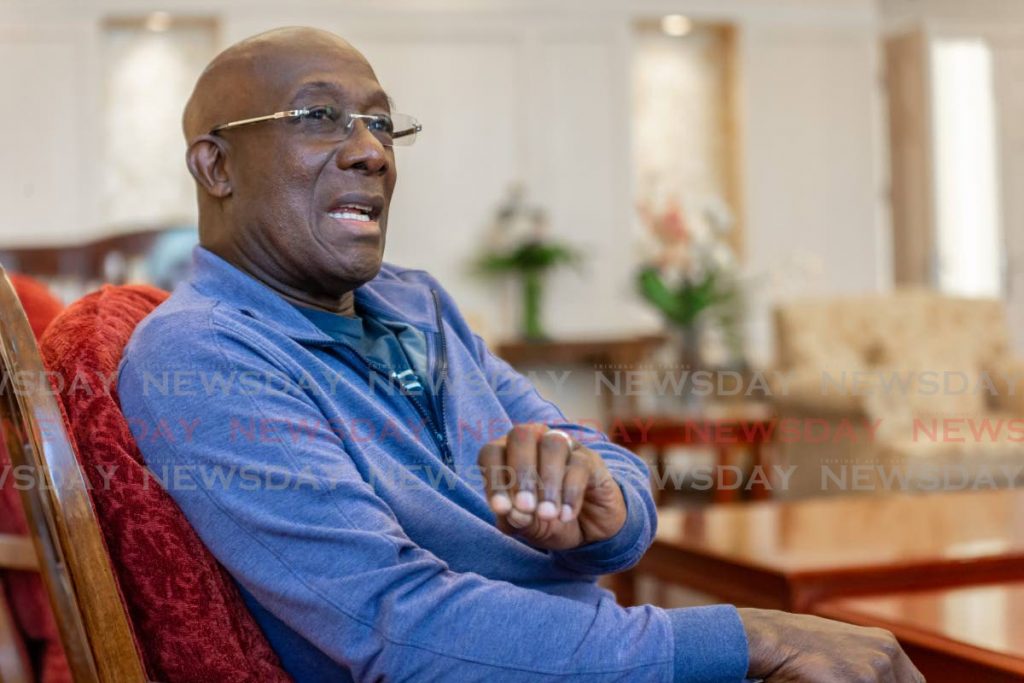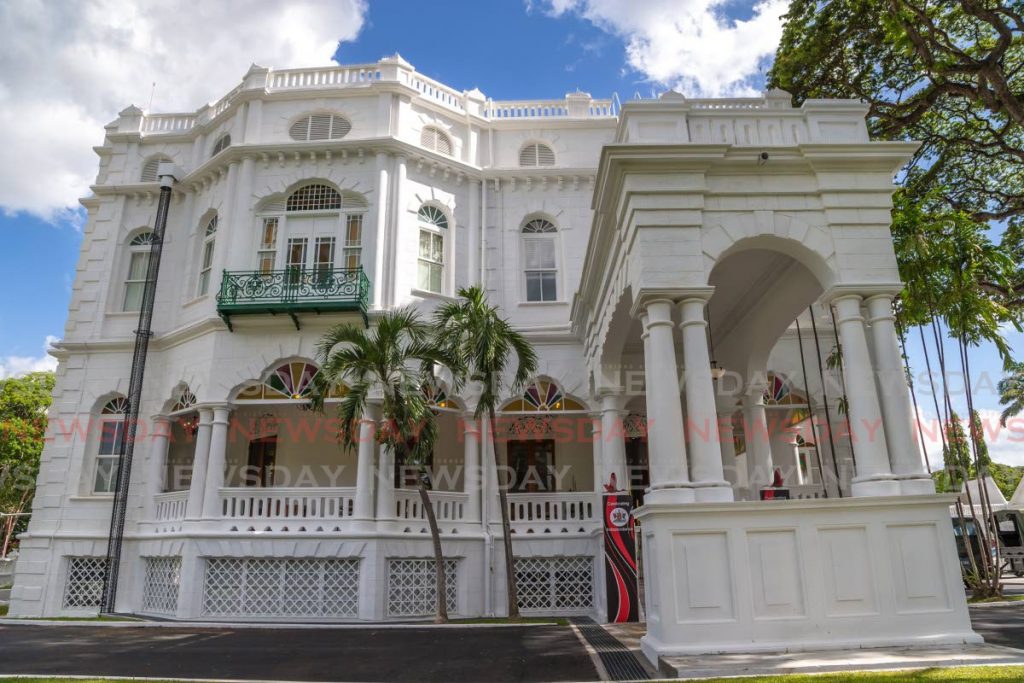A chat with the PM: Dr Rowley shares his love of culture

The Prime Minister describes himself an old-fashioned man. He has never used an ATM in his life. He has a practically untouched Kindle chucked away in a drawer somewhere after three days of use, and he has a deep love of cultural preservation.
Newsday sat down with Dr Rowley in November at the Diplomatic Centre, St Ann’s to discuss some of his favourite things: art, culture, calypso, literature, TT’s education system and digitising the country.
“Culture is what life is – what you do while you are alive. I am, at the personal level, a very conservative guy. I like history. I like historical things. I like art and music – but the older variety. I always think what has gone before will always be challenged, but what is the challenge, you usually find out later on, is
that it had more value than you thought you had at the time when it was current.”
Rowley, 71, grew up under British colonial rule. He was 13 when the country became independent in 1962. He grew up watching West Indies captain Sir Garry Sobers earn his reputation as the greatest all-rounder and Muhammad Ali fight his way to becoming one of the greatest boxers.
“I enjoyed my growing-up because there were such great things happening. In sport there were Pelé, Muhammad Ali and Garry Sobers.
"In politics there was the whole liberation period, then there was the anti-apartheid movement. All of these things were happening in my time, and as a young person I was riveted.”
DH Lawrence and Vladimir Nabokov are among his favourite writers. Once, he had all of DH Lawrence’s books, and he wanted his daughters Tonya and Sonel to love them too.

-
“I read a lot when I was coming up through school, and I desperately wanted my children to read the same things I read…They read a lot of books, but I could not get them as interested in the classics as I was. Maybe it was because I was a colonial.”
He used to buy them books like Charlotte Brontë’s Jane Eyre, Jack London’s Call of the Wild and Anna Sewell’s Black Beauty, but they weren’t interested. Though his children refused to read what he liked, he’s grateful they love to read.
He especially wanted his daughters to read the Kaywana Trilogy – Children of Kaywana, Kaywana Stock and Kaywana Blood – by Guyanese author Edgar Mittelholzer.
The Kaywana trilogy discusses the history of Guyana, including the colonisation and settlement by
the Dutch and British, the enslavement of Guyana’s First People, uprisings of enslaved Africans and the rape of enslaved women which led to the miscegenation of the population. The first book was set in 1616. Kaywana’s mother is from the First People and her father is British.
The trilogy follows her bloodline over 350 years.
Rowley wanted his children – and the nation’s children – to read books like the Kaywana Trilogy so they would have a better understanding of the history of colonialism in the region.
“I didn’t think those things were in our school system, and what was worrisome to me
was that children only seemed to be reading what is on the school curriculum, and that the curriculum could only hold so much. You could only do so much in school. If you really get motivated, school time or not, you’re going to read.”
Books, just books, no Kindle
Rowley doesn’t just love reading; he loves everything about books, including the touch, smell and joy of flipping a page to find out what happens next.
“I like books. I bought a Kindle, and after three-four days, I put it under my bed because I didn’t like the idea of not being able to turn a page…I could not locate pages in the Kindle.
"I’m reading a book now, and if an idea requires me to go back to it, I think I know where I have to go. I can visualise the page, and I could figure out where it is. I could not do that with the Kindle. I just felt lost.”
Like literature, his daughters do not share the same taste in music as him.
“I could not get them to listen to what I liked. If I had to move my daughter’s car out of the garage, I would have to change the radio station first.”
His favourite music is old-school calypso such as Lord Kitchener and the Mighty Sparrow and he appreciates the literature in their lyrics.
“Old calypso had stories or deep thoughts. When you listened to it, you marvelled at how this person – sometimes a very simple person – was able to write, craft and capture so deeply the thoughts that we put to music.”
Reflecting on Sparrow’s work over the decades, Rowley said there wasn’t a subject he did not discuss.
“Some were so arbitrary or personal you did not think anyone could have sung on that subject. He listened to the tune, and what made up the script, the soul sometimes humorous, sometimes compelling that made me think: ‘You know, I hadn’t thought of that, but it’s true'"
Why save TT's buildings, paintings
Preservation of the country’s historical artifacts, from buildings to paintings, is a personal priority of the PM.
“When I got the responsibility of the country’s affairs, even though it was a difficult period, I could not condone the abandonment of our historical buildings like the Magnificent Seven, President’s House, Parliament (the Red House) and Whitehall."
The President’s House restoration finished in December 2019 costing $89 million. Rowley said it would not need any more major work for another 40 years or more. He considers the buildings constructed during colonial times a part of the national patrimony.

“We really were going down the wrong road by allowing them to deteriorate. It cost a fair amount of money to get them (restored), but that is what money is for, to use for the betterment of society. Whatever we invested in the restoration of these buildings was money well spent, and effort and time was spent.”
The Red House reopened in January and the restoration cost $441 million. Now that Parliament is back in the Red House, he said, people are more comfortable. The Senate and the Lower House can meet simultaneously and members can adequately distance themselves.
“The staff is comfortable and safe. I shudder to think what would have happened in this covid19 period if we were caught in that little space at the Waterfront. If the Parliament was there, we would have been in big trouble.”
Rowley was told Mille Fleurs had to be demolished. However, the Cuban restoration team hired examined the building and reported the building could be saved. It was opened in August. Restoration and renovation work cost about $10 million.

“Mille Fleurs is really a treasure. It is completely restored. It’s so lovely just to look at.”
The National Trust now operates from Mille Fleurs, and Rowley said it will host events and activities there to generate funds which will then be used for further maintenance.
“Aesthetically, TT is a much better place now, having saved that building. The Magnificent Seven is part of our patrimony. If you want to market Port of Spain, you could hardly offer a better example of the grandeur and history and quality of the city than just to drive along Queen’s Park West."
With appropriate conditions, he hopes Whitehall, the Prime Minister’s office, will be open to the public. He hopes the same for Castle Killarney (Stollmeyer's Castle) and Queen’s Royal College (QRC), which also needed to be repaired for the students' safety.

-
“I don’t think there’s a place in the country that’s more photographed. When you talk about inviting people as tourists, when tourists come, what exactly do you offer them? Usually, it’s to sightsee.”
Rowley believes a country’s cultural patronage and legacy should be with the country. In December 2015, the Government bought ten paintings by 19th-century Trinidadian artist Michel Jean Cazabon for £191,500 or approximately $172,000, in the UK.
“Not only should we have got those paintings back in this country and put them on display for our children, but the story of Cazabon and the era, life and style should really be a regular conversation in our education system, and because it has not been, that’s why Cazabon means nothing to so many people in this country.”
Rowley said TT citizens are living in a cultural desert because people don’t know their history or appreciate their own artists.
“You would leave here, go on vacation abroad and go to someone else’s museum and be blown away by it, but to have our own presented to us, in such a valuable way, and you still get people talking about whether or not it was important to have gotten them.”

In October, the Government tried to buy some more Cazabon paintings in an auction but was not able to get any.
“Other people are claiming our patrimony. We probably didn’t do as much as we would have liked to ensure that we have control of what is in fact our patrimony.”
Rowley said citizens do not value their own artists; only when people are recognised abroad does their work get validated.
“There are young artists now who are doing well, and they should be encouraged, because they would not always be young, but their talent would always be valid.”
Next in this three-part series: the Prime Minister discusses the education system, failure and the government’s role in youth development. Read more in Monday's Newsday.

Comments
"A chat with the PM: Dr Rowley shares his love of culture"